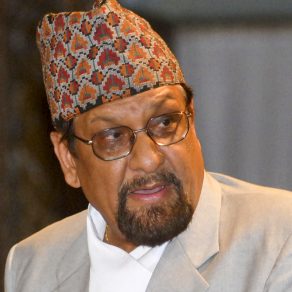Columns
External cooperation is essential to fight the pandemic
Countries can work together by sharing medical expertise and pharmaceutical competencies.
Ram Sharan Mahat
Amid the onslaught of the coronavirus that originated in Wuhan, China, the global community today confronts untold human suffering and economic devastation. The World Health Organisation declared the pandemic a Public Health Emergency of International Concern. United Nations Secretary-General António Guterres termed the situation the most serious global crisis since the Second World War and the greatest test being faced by the global community after the birth of the United Nations. The human loss has been disproportionately heavier in the developed world, including the United States and Europe. But in recent days, the number of reported infections and human deaths is rising exponentially in the developing world including South Asia. India has emerged as the third-largest victim, in terms of infections and casualties, after the US and Brazil, with 3.4 million infected cases and over 62,000 deaths. In Nepal, there are 35,523 cases, with 183 lives lost, as of the first half of August 28.
The economic fallout from the pandemic has been even more serious. In the absence of a vaccine and efficacious treatment, preventive measures such as social and physical distancing, lockdowns and travel restrictions have been adopted by countries to contain the spread of the virus, leading to restrictions on the flow of goods and services, human movement and disruption of supply chains. This has resulted in reducing economic growth and driving millions to unemployment and poverty. The latest forecast by the World Bank envisions a 5.2 percent contraction of the global economy in 2020, the deepest recession in decades.
Advanced economies including the US, Europe and Japan are projected to shrink by 7 percent, with spillover effects across developing economies. The South Asian economy is projected to downgrade by 2.7 percent. The International Monetary Fund estimates Nepal's growth rate for the fiscal year 2019-20 to go down to around 1 percent (5 percent below the pre-pandemic baseline) from 7 percent in the last fiscal year. The adverse impact of the pandemic felt in industry, tourism, remittance inflows, transport, construction, agriculture, education and trade is well known. Compared to other South Asian neighbours like India and Bangladesh, Nepal has until now fared better. But the infection has been spreading fast in recent weeks.
The Covid-19 outbreak is obviously not a country-specific problem confined to national boundaries. We are living in an interdependent world with the need for cooperation with other countries, including with our neighbours India and China. Being a small country with resource constraints and a weak health care system, Nepal is not fully prepared to deal with the pandemic that has also troubled other countries in a big way. There is a need for regional and global cooperation to fight the coronavirus and its multifaceted impact. The Indian initiative in bringing the SAARC countries together through the video summit in April this year was a welcome development that broke the stalemate inside the regional grouping, whose summits have stalled since 2014. Such gestures need to be converted into concrete outcomes. With overlapping membership and proximity, the potential for cooperation also exists among the BIMSTEC member nations—forging links to ASEAN as well.
Cooperation can begin with the sharing of medical expertise and pharmaceutical competencies. It seems possible to explore collaboration on medicinal plants and herbs that boost immunity, based on indigenous knowledge and resources. There were reports of an Ayurvedic drug being invented by Patanjali Ayurved in India that could help the fight against the virus. A treatment was also being developed at the Institute of Forestry in Nepal based on the research of aromatic plants and herbs. But these efforts seem to have stalled in the absence of adequate interest and support by the relevant authorities to achieve potential success. Nor have there been adequate trials.
In the current situation, the prevailing means to contain this highly infectious virus seems to be limited to social distancing measures, including lockdown and respiratory guidelines in the absence of proper treatment. Therefore, scientists and research teams across the world are making intensive efforts to develop vaccines to fight the virus and contain the spread of infection. In the global race for vaccine development, there are 165 vaccine candidates at different stages of development, of which 32 have reached the stage of large scale human trials. The vaccine being developed by the Jenner Institute at Oxford University is considered to be the front runner, with positive results in the preliminary trials. As vaccines require a long period for testing and further time for scale production, they are likely to be ready later this year and available for distribution only next year.
Russia has claimed a breakthrough in the corona vaccine race with the approval of Sputnik V for full-scale production to start in September. But questions have been raised by scientists globally about its efficacy, calling the certification premature and inadequately vetted. Vaccine trials in the US are reportedly showing positive results, and the vaccine would be available between January and June 2021. Nepal's neighbours are also undertaking coronavirus vaccine trials for mass production. China's major pharmaceutical company Sinofarm plans to make vaccines commercially available by the end of this year. India is launching the first and second phase clinical trials for locally produced ZyCoV-D and Covazin vaccines. The Serum Institute of India, the manufacturing partner of Oxford-AstraZeneca, is conducting phase three trials of the Covidshield vaccine to be ready for deployment in December.
Against this backdrop, it is necessary for Nepal to explore cooperation with India, China and possibly others to ensure the timely availability of adequate vaccine supply. Increased health spending is required with better management of the healthcare system and improvement of facilities.
The present crisis calls for urgent actions to address, in addition to health sector problems, the economic consequences of the pandemic. Urgency is required to protect the vulnerable and implement reforms for a quick economic revival. The strategic priorities of our economic policy should be relief, recovery and sustainable growth. There has been general agreement on the policy imperatives with respect to relief, targeted fiscal stimulus, deferred tax payment and liquidity support for sectors facing disruption and liquidity shortage. Nepal has started benefitting with additional funding from development partners like the International Monetary Fund for debt relief and under the Rapid Credit Facility, World Bank, Asian Development Bank, European Union and bilateral partners including Japan, the United Kingdom, the United States, Germany, Switzerland and South Korea to address fiscal and external financing needs. There is involvement of UN agencies in technical assistance. The felt need is improving the quality of governance, transparency and accountability, and addressing corruption problems in expenditure management at all levels.
Given the multiple impacts of Covid-19 on the living conditions of the people and socioeconomic aspects, there is a need to strengthen cooperation for promotion of trade, tourism and investment; public health know-how and technology; disaster management; and climate change. Nepal's known hydropower and clean energy potential remains one crucial area for possible regional and sub-regional cooperation in the medium term. Apart from replacing large-scale fossil fuel imports through renewable energy, exploitation of this resource could result in multiple benefits, including the control of monsoon floods and augmentation of river flow in the dry season for irrigation benefit of the neighbouring countries. While confronting the pandemic today, we should not lose sight of our medium- and long-term development objectives.
***
What do you think?
Dear reader, we’d like to hear from you. We regularly publish letters to the editor on contemporary issues or direct responses to something the Post has recently published. Please send your letters to [email protected] with "Letter to the Editor" in the subject line. Please include your name, location, and a contact address so one of our editors can reach out to you.




 24.71°C Kathmandu
24.71°C Kathmandu















